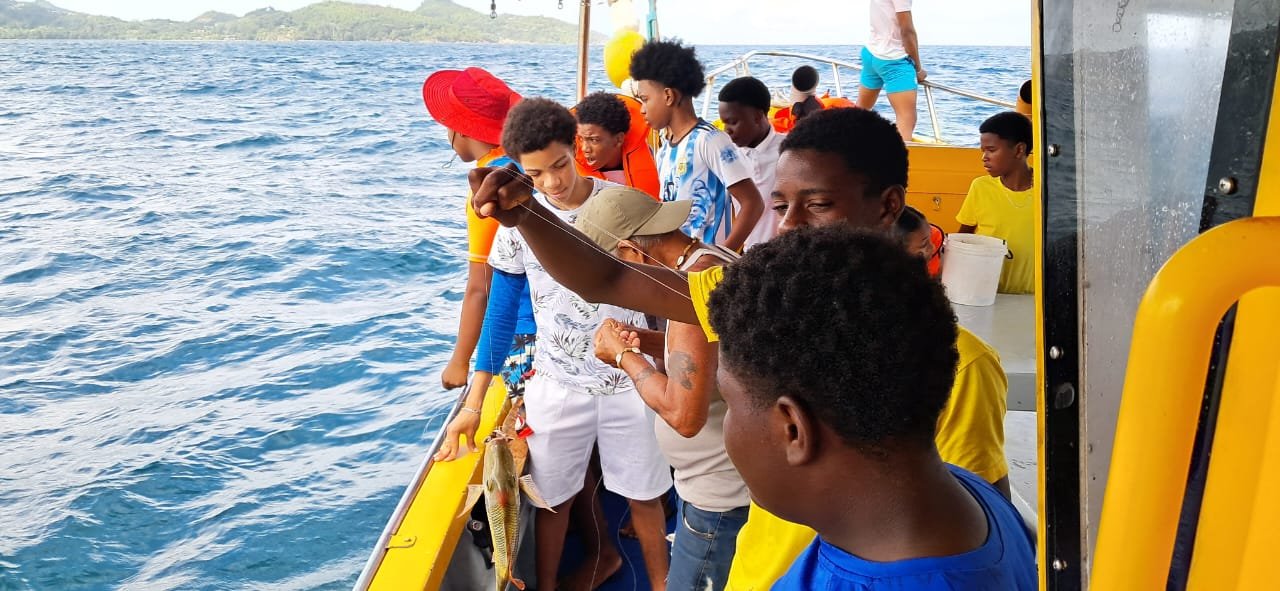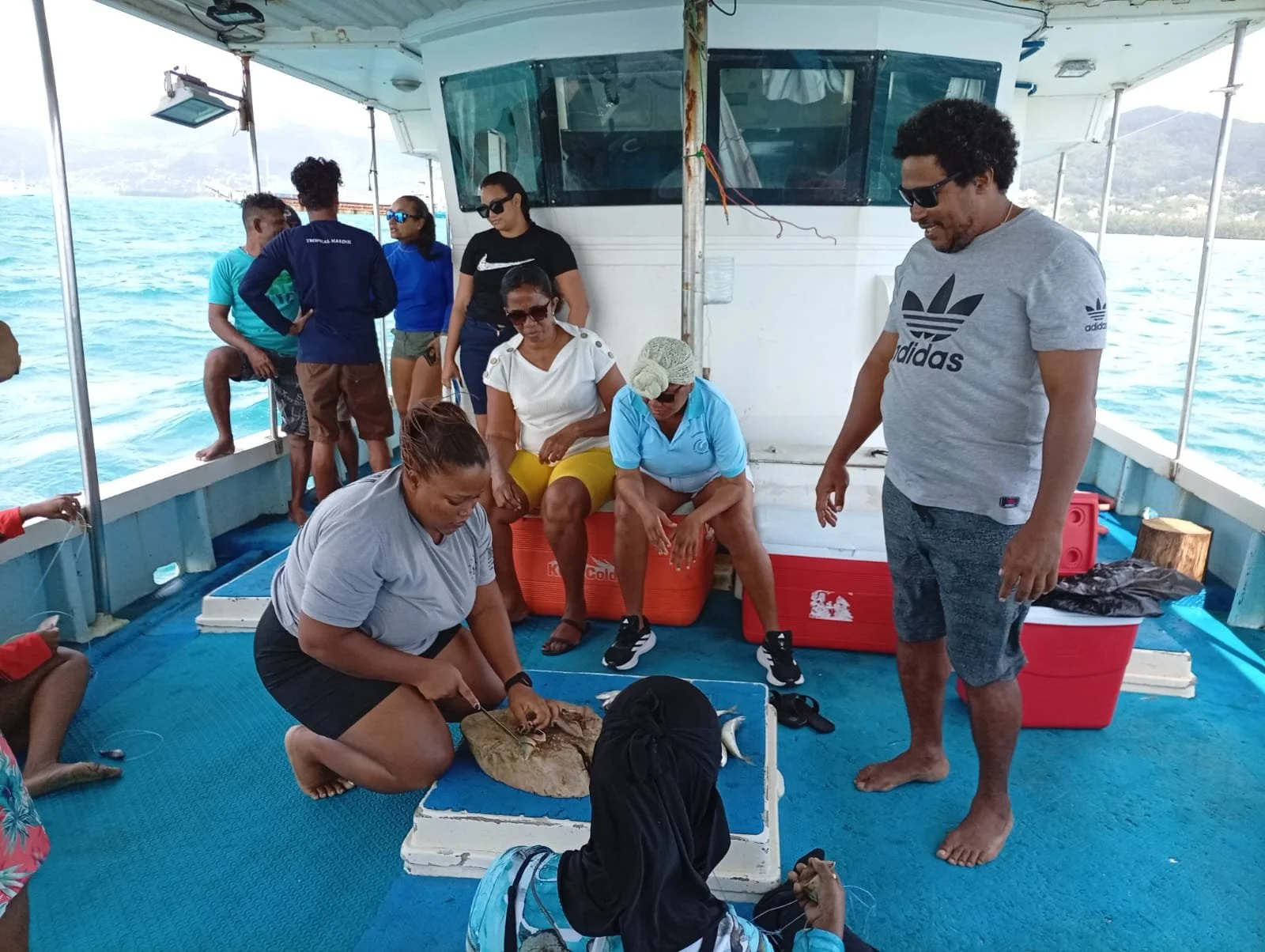With an ageing population among fishers, Seychellois small-scale fishers are concerned that their profession will disappear.
“Our youth are not interested in fishing anymore because they think the business will bring little revenue compared to other sectors, such as tourism”, states Nancy Ramkalawan-Onginjo, chairperson of the Seychelles Fisherman and Boat Owners Association (SFBOA), the largest SSF association in the Seychelles. Rodney Nicole, also on the board of SFBOA, explains that the fishers’ older generation did not get a proper financial education and this causes them to “struggle to keep their business afloat.” For him, young Seychellois witness the harder working conditions of their elders and fail to see prospects in the fishing sector: “It’s much easier to be a skipper on board a yacht where a salary is guaranteed than spending 2-3 days out at sea fishing”.
Yet, the tourism industry does not seem to deliver its promises to youth. While Seychelles unemployment rates are variable depending on the season of the year, a constant remains: youth unemployment is approximately 4 times higher than the national unemployment rate. This seems counterintuitive as Seychelles’ youth is better educated than the previous generation. The Afrobarometer, a Pan-African network conducting public attitude surveys, points to two causes: the lack of economic diversification, with opportunities mostly limited to tourism; and a skills mismatch in the labour force.
Investing in women in fisheries
Seychellois small-scale fishers, however, believe there is future in fisheries, opportunities to grow and prosperity for their communities. This is why they developed a project, supported by the Seychelles Fishing Authority, to skill women in fish quality control and hygiene, marketing and finance of pre-harvesting and post-harvesting, sales and entrepreneurship. The project developed into an accredited course titled “Seychelles fish business management” course. The course runs over 8 months, with 6 months of classes and 2 months of assignments.
In contrast with other African countries, while women make up quite an important part of the processing and marketing part of the fisheries value chain, they remain totally invisible. This is partly due to a government that has systematically overlooked women in its statistics: “There is no gender disaggregated information across fisheries activities”, says a 2023 report by the Ministry of Fisheries and the Blue economy. “Women [also] play a hugely important role at the scientific, technical, management and administrative level within SFA [Ed. Seychelles Fishing Authority] and in the Ministry.”
The fact that women play such an important role at all stages of the fisheries chain is a situation that “has developed organically”, notes this same report, and concludes: “There is no specific programme to promote women in fisheries and this should be remedied.” Despite this grim assessment, the Ministry marks the objective “addressing equity in fisheries” as “progressed”.
It indeed progressed organically because women themselves got organised and saw the potential of the fisheries sector… First, in June 2024, women in fisheries started the AWFishnet chapter for Seychelles, the Platform for African women Fishprocessors and Traders. And then, they sought support from SeyCATT, the Seychelles Conservation Climate Adaptation Trust, with funds from the Seychelles Blue Bond and established to provide grants to organisations that work on marine conservation or seek to innovate in sustainable business models.
“Currently, 28 women are taking the course”, notes Betty Mondon, coordinator of the project and president of AWFishnet in the Seychelles. Out of these 28, only a third are already involved in the sector, either in fishing, processing or by being boat owners. The rest, “come from various education and career backgrounds: some are SFA technicians, some are businesswomen, some are fisher’s wives who want to learn the business while others are unemployed looking to be skilled”.
Investing in school kids
But small-scale fishers are also looking much more ahead. “If we want to groom a new generation of fishers, we need to start at school age”, explains Rodney Nicole. SFBOA is seeking to develop various sensitization projects to encourage younger people to get into the business. They understand that skills for the job need to be acquired earlier on: “In the past, fishermen would take their kids on board for one day out at sea. But now, with the scarcity of fish, they stay 4 to 5 days out fishing: they can’t take their kids anymore”.
Jim Meme, a fisherman from the Anse Boileau Fisherman Association has participated in career’s week at schools (in the middle, on the photo), teaching safety at sea measures, helping children identify fish species and carrying out educational fishing trips with his boat. “The problem is that we need to guarantee safety on board, such as life vests for the participants”, continues Rodney Nicole, “and for this, we need funds”. He quotes as an example the young women training he delivered on fishing in the context of the Seychelles fish management business course (see first photo): “At the end of the session, they were given a handline, sinker and hooks”. Rodney Nicole, Jim Meme, and so many other fishers, are doing this on their own time and with their own resources.
Creating the conditions where youth in fisheries can thrive
Yet so much needs to be done to improve the attractiveness of the sector… and while small-scale fishing organisations can muster all their will in sensitizing about their profession, governments must follow suit, guaranteeing social rights, such as access to health, education and social security. One positive step is that Seychelles has finally set up a pension fund for fishers. “But our sick leave is barely 80 rupees [Ed. 4.65€] a day”, says Rodney Nicole. He quotes the Mauritius “bad weather allowance” as a good example to face climate change shocks, provided all the measures are in place.
For Nancy Ramkalawan-Onginjo, an easier access to credit is also necessary, without the red tape, for youth to be able to invest in better fishing gear and safety equipment. Other investments could be made to improve the sector’s resilience in the face of the impacts of climate change, such as building infrastructure to reduce post-harvest losses, for example ice plants to preserve the fish quality longer at sea. Their hope is that their government and other partners will listen and act with the objective of offering long term decent livelihoods prospects to youth.
Banner photo: School kids in an outing at sea on Jim Meme’s boat, from the Anse Boileau Fisherman Association.



